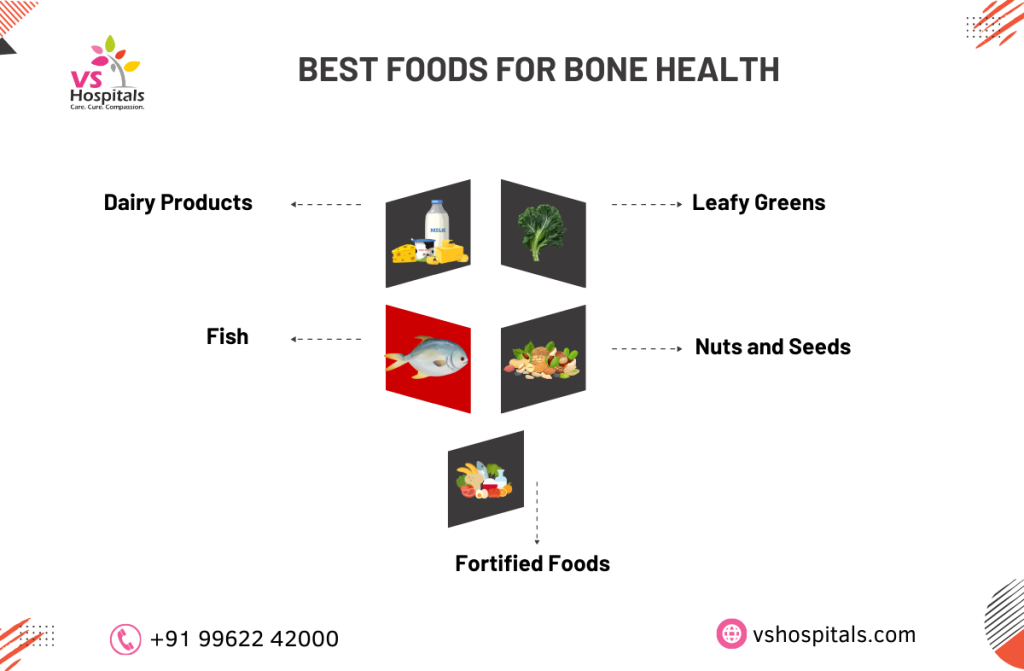How to improve bone health is a question that everyone should ask, regardless of age or lifestyle. Strong bones are essential for daily activities, providing support to your body and protecting vital organs. At VS Hospital, we focus on guiding individuals toward better bone health by highlighting what supports bone health and helping you make informed choices. A proactive approach to maintaining healthy bones can lead to a life full of energy and movement, free from the fear of fractures or osteoporosis. Let’s explore how you can take the right steps to strengthen your bones and enhance your overall well-being.
Why Is Bone Health Important?
Understanding why bone health is important helps you take proactive steps to protect yourself against potential risks. Healthy bones reduce the chances of fractures and conditions like osteoporosis as you age. This is especially crucial for women, who often experience bone loss after menopause. Learning how to improve bone health through expert care at VS Hospital and understanding what supports bone health ensures that you stay active and independent for longer.Weak bones can lead to serious injuries and prolonged recovery times. Making bone health a priority allows you to live confidently, knowing your body is strong enough to meet life’s demands.
What Affects Bone Health?
Several factors influence your bone health, many of which are within your control. By understanding how to improve bone health, you can address these factors effectively with support from VS Hospital.
- Age: Bone density naturally decreases as you get older, making it vital to focus on strengthening bones early in life.
- Diet: A lack of calcium, vitamin D, and other nutrients weakens bones over time.
- Lifestyle Choices: Smoking, alcohol consumption, and a sedentary lifestyle negatively impact bone health.
- Hormonal Changes: Women going through menopause experience a drop in estrogen levels, which can significantly reduce bone density.
- Medical Conditions: Conditions like rheumatoid arthritis or thyroid problems can also weaken bones.

What Can I Do to Keep My Bones Healthy?
Taking steps to maintain what supports bone health is easier than you think. From simple dietary changes to lifestyle adjustments, there are numerous ways to ensure healthy bones. The experts at VS Hospital recommend focusing on the following strategies for improving bone health, particularly for women.
Key Actions to Improve Bone Health in Women:
- Increase Calcium Intake: Women should consume calcium-rich foods like dairy, leafy greens, and fortified cereals daily to support bone strength.
- Stay Active: Weight-bearing exercises like walking, jogging, or dancing help build and maintain bone density.
- Hormonal Health: Monitoring hormonal changes, especially during menopause, is essential to how to improve bone health in women.
With these steps, you can take control of your bone health and enjoy a more active lifestyle.
11 Ways to Increase Bone Density Naturally
Strengthening your bones doesn’t always require medication. Incorporating natural methods can significantly impact how to improve bone health and enhance overall well-being. Let’s explore 11 proven strategies:
1. Weightlifting and Strength Training
Strength training places controlled stress on bones, encouraging them to rebuild and become stronger. Activities like lifting weights or resistance exercises are excellent ways to increase bone density and support overall skeletal strength. This highlights why bone health is important for maintaining mobility, reducing the risk of fractures, and ensuring a higher quality of life as we age. Incorporating regular strength training into your fitness routine is a proactive step toward long-term bone health.
2. Eat More Vegetables
Vegetables are rich in vitamin C, which helps bone-forming cells. Eating a variety of greens and colorful vegetables ensures you get the nutrients necessary for what supports bone health.
3. Consume Calcium Throughout the Day
Instead of getting all your calcium in one meal, spread it out throughout the day to maximize absorption. Opt for snacks like yogurt, almonds, or fortified drinks.
4. Eat Foods Rich in Vitamins D and K
Vitamin D helps your body absorb calcium, while vitamin K supports bone health by modifying proteins involved in bone formation. Add fatty fish, egg yolks, and green vegetables to your diet.
5. Maintain a Moderate Weight
Both being underweight and overweight can harm bone health. Aim for a balanced weight to reduce the risk of fractures and joint issues.
6. Avoid a Low-Calorie Diet
Eating too few calories deprives your body of essential nutrients needed to keep bones strong. Instead, focus on balanced meals that include proteins, healthy fats, and carbohydrates.
7. Eat More Protein
Protein makes up about 50% of bone volume. Consuming adequate protein supports bone repair and maintenance, especially for older adults.
8. Eat Foods Rich in Omega-3 Fatty Acids
Foods like salmon, flaxseeds, and walnuts are rich in omega-3 fatty acids, which reduce inflammation and promote bone health.
9. Eat Foods Rich in Magnesium and Zinc
Magnesium helps activate vitamin D, while zinc contributes to bone structure. Nuts, seeds, whole grains, and dark chocolate are excellent sources.
10. Avoid Smoking
Smoking reduces blood flow to the bones, slowing down the healing process and increasing the risk of fractures.
11. Avoid Heavy Drinking
Excessive alcohol weakens bones and reduces calcium absorption. Moderate your alcohol intake to support overall bone health.
Which Foods Increase Bone Density?
Your diet plays a significant role in how to improve bone health. Certain foods are excellent for increasing bone density naturally and preventing bone-related diseases. With the guidance of VS Hospital, you can focus on nutrient-rich foods that provide essential support for your bones.
Best Foods for Bone Health:
- Dairy Products: Milk, cheese, and yogurt are high in calcium.
- Leafy Greens: Spinach, kale, and collard greens are rich in calcium and magnesium.
- Fish: Fatty fish like salmon and mackerel contain vitamin D and omega-3 fatty acids.
- Nuts and Seeds: Almonds, chia seeds, and sunflower seeds are excellent sources of magnesium and zinc.
- Fortified Foods: Orange juice, plant-based milk, and cereals are often fortified with calcium and vitamin D.
Eating these foods regularly ensures your body gets what supports bone health and prevents deficiencies that weaken bones.
How to Manage Body Weight and Bone Health
Maintaining a healthy body weight is essential for overall well-being and strong bones. Why bone health is important lies in its role in supporting mobility, preventing fractures, and reducing the risk of osteoporosis. Here are some tips to manage body weight and promote bone health:
- Balanced Diet: Include calcium-rich foods (dairy, leafy greens) and vitamin D (fatty fish, fortified cereals) for strong bones.
- Regular Exercise: Weight-bearing activities (walking, jogging) strengthen bones and help maintain a healthy weight.
- Healthy BMI: Avoid being underweight, which can reduce bone density, and prevent excess weight that stresses the bones.
- Hydration: Drink plenty of water to support joint and bone health.
- Limit Processed Foods: Reduce intake of sugary and high-sodium foods that can weaken bones.
Prioritizing a balanced lifestyle ensures better body weight management and optimal bone health.
Why Bone Health is Important?
Taking proactive steps toward how to improve bone health is a lifelong commitment that pays off in countless ways. Healthy bones support mobility, reduce injury risks, and promote overall quality of life. Women, in particular, should focus on strategies for how to improve bone health in women, as hormonal changes increase their risk of bone loss. With expert care from VS Hospital, you can protect your bone health and prevent potential complications.
Conclusion
How to improve bone health starts with understanding its importance and making informed choices about your diet and lifestyle. With the right approach and guidance from VS Hospital, you can strengthen your bones naturally and prevent conditions like osteoporosis. Remember, prioritizing what supports bone health today ensures a healthier, more active tomorrow.




